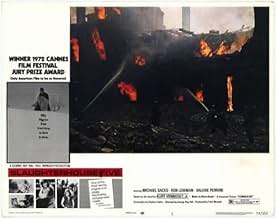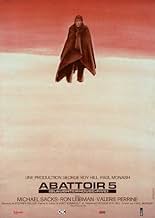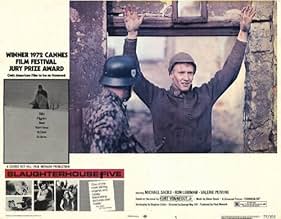Billy Pilgrim has mysteriously become unstuck in time. He goes on an uncontrollable trip back and forth from his birth in New York to life on a distant planet and back again to the horrors o... Read allBilly Pilgrim has mysteriously become unstuck in time. He goes on an uncontrollable trip back and forth from his birth in New York to life on a distant planet and back again to the horrors of the 1945 fire-bombing of Dresden.Billy Pilgrim has mysteriously become unstuck in time. He goes on an uncontrollable trip back and forth from his birth in New York to life on a distant planet and back again to the horrors of the 1945 fire-bombing of Dresden.
- Director
- Writers
- Stars
- Awards
- 3 wins & 4 nominations total
- German Leader
- (as Friedrich Ledebur)
- Young German Guard
- (as Nick Belle)
- Director
- Writers
- All cast & crew
- Production, box office & more at IMDbPro
Featured reviews
But George Roy Hill did an excellent job conveying the overall feel of the book -- the time jumping was flawless and I didn't find it hard to follow at all. The actor who played Billy Pilgrim captured Billy's passive, calm and vaguely anti-social demeanor. Lazarro, Montana and Billy's wife are also well played.
George Roy Hill had a knack for directing movies made from great books -- e.g., "The World According to Garp" -- and in the end, I was pleasantly surprised how well this movie turned out.
As far as the Vonnegut adaptations go (I know of four -- this one, "Mother Night," "Breakfast of Champions" and the god-awful "Slapstick") this one is the best of the bunch.
I've always wanted to see a movie version of "Sirens of Titan," but it'll probably never happen -- so "Slaughterhouse Five" is my only chance to "see" Trafalmadore.
Recommended to any true Vonnegut fans. Other people probably won't appreciate it.
Technically, the film uses the moments where Billy jumps in time as meaningful transitions. It interweaves lessons learned from one part of his life and applies it to the present moment (whenever that is). The film's real treasures are the supporting characters that surround Billy. It also vividly transports you to WW2, a semi-autobiographical account of Kurt Vonnegut's real life experiences in Dresden. The film is filled with anecdotes that present the film's other main theme, that life is indeed ironic.
I was deeply touched by this film, with it's ability to whisk you from scenes of horror to amusing 'Kodak moments'. The music poignantly represents these transitions, and helps to carry the film. In the end, you can accept his death, by having lived his life.
This flawed movie was a cult classic since its release because legions of Vonnegut fans were so fond of the novel that they could overlook the film's flaws. This is probably the only Vonnegut novel to make the transition to the screen as a movie that more than a handful of people are willing to watch. And they watch it again and again. I am reminded of Voltaire lovers who enjoy Leonard Bernstein's Candide. This seems to be the best of all possible Vonnegut movies.
There is a wealth of trivia associated with the cast. Michael Sacks disappeared into obscurity. Sharon Gans joined a community theater company that seemed more like a cult. Holly Near became a feminist folksinger. Valerie Perrine would later give a great performance as Honey Bruce in Bob Fosse's Lenny. Perry King and Ron Liebman became minor stars.
The story is largely allegorical. It is not science-fiction. Vonnegut is coping with the trauma of World War II, particularly the horrors he witnessed during the firebombing of Dresden. Billy Pilgrim's emotional numbness and alientation are characteristic of combat fatigue or post traumatic stress. Despite the lack of a chronological plot, Billy Pilgrim's arc is linear.
To the uninitiated, being "unstuck in time" can be confusing. It's sort of like one's first encounter with hypertext. Perhaps, that's why the movie is better on the second or third viewing. The key to enjoying Slaughterhouse Five is to focus on the best scenes and performances -- much like Billy Pilgrim's advice on living.
Did you know
- TriviaAlthough Vonnegut's renowned refrain, "And so it goes", appears over 100 times in the novel, it it is not uttered even once in the movie version.
- GoofsWhen Billy Pilgrim is asked by the American soldiers, "Where's your rifle?", he replies that he doesn't have one because he's a chaplain's assistant. However, in the United States Army, the primary duty of the chaplain's assistant in a combat zone is to protect the chaplain, so all chaplain's assistants must carry rifles. Because Chaplains are considered ministers in uniform they are forbidden from carrying weapons even when in combat zone.
- Quotes
Billy Pilgrim: [in his sleep] You guys go on without me. I'll be alright.
Prof. Rumfoord: All he does in his sleep is quit, surrender, and apologize. I could carve a better man out of a banana.
- Crazy creditsThe Universal logo does not appear on this film.
- ConnectionsEdited into The Clock (2010)
- SoundtracksConcerto No. 5 for Harpsichord in F minor, BWV 1056 - 2nd movement 'Largo'
Written by Johann Sebastian Bach (as J.S. Bach)
Performed by Glenn Gould, Piano
Columbia Symphony Orchestra
Vladimir Goldschmann, Conductor
- How long is Slaughterhouse-Five?Powered by Alexa
Details
- Release date
- Country of origin
- Official sites
- Languages
- Also known as
- Slaughterhouse-Five
- Filming locations
- Prague, Czech Republic(as Dresden)
- Production company
- See more company credits at IMDbPro
Box office
- Budget
- $3,200,000 (estimated)
- Runtime1 hour 44 minutes
- Sound mix
- Aspect ratio
- 1.85 : 1
Contribute to this page







































